Ever since the Canadian Hockey League has adopted its annual import draft, the talent pool of European players who have come over has been incredible. Nearly 190 imports who have come over to North America to play junior hockey have graduated to play at least one game in the NHL. Imports have been very helpful additions to any team, providing much-needed leadership and professionalism to otherwise youthful and inexperienced teams. There is, however, one question to be asked: Are there some teams in the CHL that are better for imports than others? In the years that I have been following the CHL, as well in doing my own research, I found that the answer to that question can be “yes.” I have noticed that there are teams where imports can thrive more than others. That being said, here are the teams I have found to be the 10 best franchises in the Canadian Hockey League for imports:
 10. Chicoutimi Saguenéens (QMJHL)
10. Chicoutimi Saguenéens (QMJHL)
Although 23 imports have played for the Chicoutimi Saguenéens over the course of the team’s history, including their current #1 goaltender, they have especially had considerable success with players from Slovakia. No team in the QMJHL has been better for them, an encouraging statistic since that nation is starting to lose traction in junior hockey. Ten Slovak imports have worn the double blue since 1995 and most of them have enjoyed incredible success. The first was Ľuboš Bartečko, who had an impressive 73 points (32 goals, 41 assists) in 70 games as a rookie. Although Bartečko was eventually traded, it was his début that set in motion the success of other Slovak imports on the Saguenéens. The season after Bartečko’s rookie campaign, the Saguenéens made a trade with the Sherbrooke Faucons for a promising young defenceman, also from Slovakia, named Radoslav Suchý. Suchý had considerable numbers going into his tenure with Chicoutimi but he shone while with the Saguenéens. He finished the 1996-97 season, his third in the QMJHL, with 69 points (11 goals, 58 assists) and he was named to the QMJHL Second All-Star Team. Also that year, the Saguenéens participated in the Memorial Cup and Suchý was awarded the George Parsons Trophy for the tournament’s most sportsmanlike player. For his efforts, Suchý was signed as an undrafted free agent by the Phoenix Coyotes.
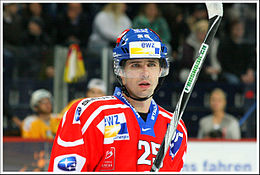
After Suchý graduated, more Slovak imports began to find homes in Chicoutimi. It was the 2000s, though, when they began to assert themselves. In the early parts of the decade, the Saguenéens employed the services of Stanislav Hudec, a defenceman with incredible offensive upside. In his second season with the team, he scored 42 points (ten goals, 32 assists), nearly twice the amount of points he had as a rookie. In 2003, another Stanislav came to Chicoutimi and completely took the team by storm. Stanislav Lašček scored 59 points (17 goals, 42 assists) in 57 games as a rookie but went undrafted to the NHL; the next season, he scored 90 points (18 goals, 72 assists) and he was chosen 133rd overall in the 2005 NHL Entry Draft by the Tampa Bay Lightning. In his last year of junior hockey, 2005-06, Lašček scored 135 points (47 goals, 88 assists) in 64 games playing on a line with David Desharnais and Maxime Boisclair; his assist total was the second highest in the QMJHL that season.
Just like Chicoutimi is kind to imports from Slovakia, the Québec Remparts are the same to imports from Russia. There have been imports from other countries on the team over the years, especially the new incarnation of the team; it is, however, the Russians who are completely forming the identity of the Remparts in recent memory. One can only look at the impact of Alexander Radulov. After a rookie season in 2004-05 in which he scored 75 points (32 goals, 43 assists) in 65 games, it was his second season in the QMJHL in which he shone, showing just how dynamic imports can be.
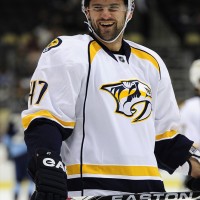
Radulov scored 152 points (61 goals, 91 assists) to lead both the QMJHL and the Canadian Hockey League in scoring; in fact, in one game against Rimouski near the end of the 2005-06 season, he scored 11 points (seven goals, four assists) in a game the Remparts won 16-3. He followed up that incredible regular season with 55 points (23 goals, 32 assists) in the playoffs but he was not named the playoff MVP; he did, however, get named the MVP of the Memorial Cup tournament, helping his team win the championship. He finished the season with several awards, including the QMJHL and CHL player of the year honours. He has enjoyed success in both the NHL and the KHL, winning the KHL Golden Stick Award in both 2010 and 2011; he is now back in the NHL after a three-and-a-half-year absence to play for Salavat Yulaev Ufa in the KHL.
After the later graduations of twins Roman and Ruslan Bashkirov, as well as Washington Capitals prospect Dmitry Kugryshev, the Remparts decided to delve further into the talent pool of Russian imports. After the 2011 World Under-18s, they found their man when they selected Mikhail Grigorenko, who immediately took over their team’s offense. He scored an impressive 85 points (40 goals, 45 assists) in only 59 games, missing time to play as a 17-year-old for Russia at the 2012 World Juniors, where he helped win a silver medal for his country. Grigorenko’s impressive first, and possible only, season of major junior hockey in North America garnered him QMJHL rookie of the year honours and he is now expected to be a high first-round pick in the 2012 NHL Entry Draft.
For the most part, the Kelowna Rockets have been known recently for their development of strong defencemen with the likes of Shea Weber, Duncan Keith, Tyler Myers and Luke Schenn among their recent blueline graduates. The team, however, is also good for developing strong imports. While not many of them have gone on to the NHL as of yet, it is impressive to think of who they have developed out of players coming from Europe. Out of the few imports who have graduated on to the NHL out of Kelowna, two Swedish players have been enjoying considerable success on Canadian NHL teams.
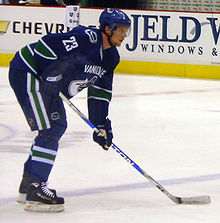
Defenceman Alexander Edler joined the Rockets for only one season, the 2005-06 campaign, a year after he was drafted 91st overall by the Vancouver Canucks. He was a stabilizing two-way force on the blueline, scoring an incredible 53 points (13 goals, 40 assists). His assists were the most by any rookie in the WHL that season. The 6’4″ Swedish rearguard made his NHL debut not long after graduation from Kelowna and, in his first full NHL season, he played in the 2008 NHL YoungStars Game. Four years later, he played in his first NHL All-Star Game. Three years after Edler graduated from the Rockets, another young Swedish player emerged on the roster. Forward Mikael Backlund almost did not arrive in Kelowna, playing with Västerås in the Allsvenskan in his homeland for the majority of the 2008-09 season; after playing one game with the Calgary Flames, though, he reported to the Rockets, scoring an impressive 30 points (12 goals, 18 assists) in only 28 games. He also scored 13 goals in the playoffs to lead the Rockets to the WHL championship, eventually losing the Memorial Cup to the Windsor Spitfires. He is currently playing full-time in Calgary, nearly five years after being their first-round pick in 2007, but injuries are keeping him out of the lineup on various occasions.
One great thing about Kelowna is how they have given a home to some imports from less-developed hockey countries. They have had two players from Latvia in franchise history, Lauris Dārziņš and Kaspars Saulietis; they could have had a third in 2011-12 after they chose Zemgus Girgensons in the 2011 CHL Import Draft but he opted not to report, keeping his eligibility to play at the University of Vermont intact. They have also had one Austrian player, Thomas Raffl. To further show how international they have been, in 2010-11, they had Andreas Stene from Norway and Gal Koren from Slovenia on their roster.
Just like Kelowna, the Owen Sound Attack is another team who have been good to imports from the land of maroon and white. Ever since the team has been named the Attack, three players from Latvia have found homes in Owen Sound. One of the most illustrious of these is Agris Saviels. A former 2000 NHL Draft pick of the Colorado Avalanche, Saviels came to North America in 1998 to play for the Notre Dame Hounds of the Saskatchewan Junior Hockey League. The young defenceman, who was only 16 at the time, scored six goals and 19 points in 30 games, and even participated at the World Junior Championships in 1999 shortly before his 17th birthday. The Owen Sound Platers took notice of Saviels’ accomplishments and they chose him first overall in the 1999 CHL Import Draft. In three seasons in Owen Sound, he scored 115 points (26 goals, 89 assists) in 193 games. He has since found success in different leagues in his native Latvia, Belarus, Russia, Slovakia, Denmark, the Czech Republic and, most recently, Italy. His success paved the way for two more Latvians, Juris Štāls and Ričards Bērziņš, to come over to play for the Attack.
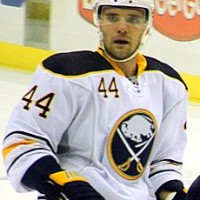
Another defenceman to enjoy considerable success with the Attack, showing again how valuable imports are, came from Slovakia. Andrej Sekera was chosen second overall in the 2004 CHL Import Draft after playing for the under-20 team of HK Dukla Trenčín, the same team that developed Zdeno Chára; he had been chosen 71st overall in the 2004 NHL Entry Draft by the Buffalo Sabres. Sekera’s first season in Owen Sound was unfavourable at best, scoring only nine points (seven goals, two assists) in 51 games. The next season, though, Sekera had an incredible surge in his point production, scoring 55 points in the same amount of games he played the season before, tripling his goal totals, scoring 21 goals. He also enjoyed two accolades many imports have not; he was an alternate captain on the Attack that season and he also won a league award, winning the Max Kaminsky Trophy as the OHL’s top defenceman. Since his graduation from the OHL, Sekera has become one of the Sabres’ most dependable blueliners, garnering him a multi-year contract extension in 2011. He also got the opportunity to represent his native Slovakia at the 2010 Olympics in Vancouver.
 6. Sault Ste. Marie Greyhounds (OHL)
6. Sault Ste. Marie Greyhounds (OHL)
When it comes to the subject of imports wearing letters, one can look to the Sault Ste. Marie Greyhounds for being progressive. They were actually the first team in the OHL to have an import as team captain. After scoring 56 points (21 goals, 35 assists) as a rookie in 1998-99, Josef Vašíček was named captain of the Greyhounds the following season. He replied with a 72-point season (26 goals, 46 assists) before joining the Carolina Hurricanes the following year. He also became the first former Greyhound import to win the Stanley Cup, winning hockey’s Holy Grail in 2006 with Carolina. Vašíček was loved by the fans and management in Sault Ste. Marie and his death in the Lokomotiv plane crash on September 7, 2011, sent shock waves throughout the team. The tragedy also hit home for another former import Greyhound. Tomáš Rachůnek, who played for the Greyhounds from 2008 to 2010, lost his older brother, former NHL player Karel Rachůnek, in the crash.
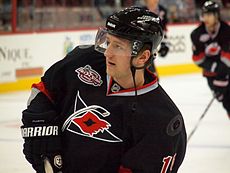
It has been a relatively kind existence for Czech imports in Sault Ste. Marie, though. One who enjoyed veritable success in a single season was Jiří Tlustý. Tlustý was chosen 31st overall by the Greyhounds in the 2005 CHL Import Draft but he did not initially report, opting instead to play for HC Kladno in his homeland. The next year, though, he was chosen 13th overall in the 2006 NHL Entry Draft by the Toronto Maple Leafs and the organization looked to bring him over to North America early. He played in six games with the Marlies, scoring four points, including three goals, before he was assigned to the Greyhounds. He missed some time with an ankle injury but he did have a solid season with the Soo, scoring 34 points (13 goals, 21 assists) in only 37 games. He had a controversial tenure with the Leafs but, upon being traded to Carolina, he is finally starting to find his niche.
While imports have been doing well as forwards with the Greyhounds, import goaltenders have also been given the opportunity to shine. Although they have only had three European goalies come through their organization, the most notable of these has been Robin Lehner. In 2009-10, he came to a team in desperate need for a top-notch goalie and did he ever deliver. He missed some time after contracting the H1N1 virus (swine flu) but he had an All-Star season, finishing with a record of 27-13-0-3, a 2.80 goals-against average, a .918% save percentage and five shutouts in 47 games. He followed that up with a Calder Cup championship with the AHL’s Binghamton Senators and an increasing stock in the Ottawa Senators organization.
 5. Shawinigan Cataractes (QMJHL)
5. Shawinigan Cataractes (QMJHL)
Unlike many teams on this list, the Shawinigan Cataractes have not had many of their imports graduate to the NHL. They have had only three players who have appeared in at least one NHL game but the quality of two of them, both from the Czech Republic, has been immeasurable. Radim Vrbata joined the Cataractes in 2000 after two seasons with the Hull Olympiques, scoring 134 points (51 goals, 83 assists) in 113 games over those two years. After being chosen 212th overall in the 1999 NHL Entry Draft by the Colorado Avalanche, Vrbata went to Shawinigan with incredible optimism for a great final season of junior hockey, scoring 120 points (56 goals, 64 assists) in only 55 games. He currently plays on the Phoenix Coyotes with four other former CHL imports: Martin Hanzal (Red Deer Rebels), Michal Rozsíval (Swift Current Broncos), Mikkel Boedker (Kitchener Rangers) and Rostislav Klesla (Brampton Battalion).
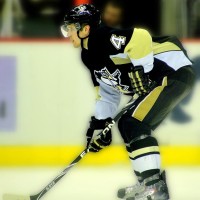
A former Coyotes defenceman is also a former import out of Shawinigan. Currently with the Pittsburgh Penguins, Zbyněk Michálek joined the Cataractes after his rights being traded from the Victoriaville Tigres. Michálek enjoyed two solid offensive seasons in Shawinigan. He scored 39 points (ten goals, 29 assists) in 69 games in his first QMJHL season in 2000-01 and he was rewarded by being signed to an entry-level contract as an undrafted free agent by the Minnesota Wild on September 29, 2001. He returned to the Cataractes for a second season in 2001-02 and he scored 54 points (16 goals, 38 assists) in 68 games. A year later, his younger brother Milan was chosen ninth overall in the 2003 NHL Entry Draft by the San Jose Sharks. Within three years, both were playing in the NHL.
Shawinigan has been a good home to seven Russian imports over the years, one of the best right now being Anton Zlobin, who has nearly a point per game in two seasons; as well, Kirill Kabanov will be considered an alumnus of the Cataractes upon his graduation. The Cataractes have also been very kind to imports from developing hockey nations but some have had more success than others. They include Armands Bērziņš, a Latvian forward who had two stellar seasons between 2001 and 2003, and Dominik Schlumpf, a Swiss defenceman who played an impressive nearly four years between 2008 and 2011, longer than any other import has for the organization and possibly in the CHL.
The London Knights have been one of the most successful teams in recent CHL history and it is only fitting that they have had some of the most successful imports. The team managed to attract some significant names in the early 1990s, long before the Hunter brothers purchased the franchise in 2000. Certain impressive imports who may be better known in Europe than here in North America who called London home include Swedish defenceman Stefan Bergkvist, who played seven NHL games with the Pittsburgh Penguins; Russian sniper Maxim Spiridonov, who has enjoyed incredible success in the KHL; Finnish goaltender Ilpo Kauhanen, who was a steady netminder in both his homeland as well as in the Deutsche Eishockeyliga in Germany; and Norwegian blueliner Jarl Espen Ygranes, a feisty rearguard who was a defensive catalyst in the Get Ligaen for several years.

Upon the sale of the Knights to Dale and Mark Hunter in 2000, the quality of the imports to come to London has been even more incredible. In recent memory, none have had the most incredible impact as Sergei Kostitsyn. Kostitsyn was actually the second player from his hometown of Novopolotsk, Belarus, to suit up for the Knights after arriving in London; Vadim Karaga, who is the same age as Kostitsyn’s brother Andrei, played 21 games for them in 2003-04 before being traded to the Windsor Spitfires. Additionally, Kostitsyn became the second member of his family chosen in the CHL Import Draft, since Andrei was chosen 15th overall in the 2002 CHL Import Draft by the WHL’s Medicine Hat Tigers but he never reported. Once Sergei Kostitsyn arrived in London, he had an impressive impact on the team, leading all OHL rookies in scoring in 2005-06 with 78 points (26 goals, 52 assists) in 63 games. The next year, 2006-07, after not making the AHL’s Hamilton Bulldogs, Kostitsyn returned to London and he had a fantastic season; playing on a line with Patrick Kane and Sam Gagner, Kostitsyn, by now an alternate captain, racked up 131 points (40 goals, 91 assists), third most in the OHL. His 91 assists did not just lead the OHL and the CHL, but they also broke a Knights franchise record set by Dennis Ververgaert 24 years earlier.
After Kostitsyn graduated, the Knights enjoyed the services of several new imports but none had the calibre of the young Belarusian. That changed in 2010 when they selected Russian forward Vladislav Namestnikov 20th overall in that summer’s CHL Import Draft. The nephew of former NHL star Vyacheslav Kozlov, Namestnikov, unlike Kostitsyn, also came in with significant English-speaking skills due to living on many occasions in Detroit, Michigan, during his childhood. After a point-per-game season as a rookie, in which he scored 68 points (30 goals, 38 assists) in 68 games, he was chosen 27th overall in the 2011 NHL Entry Draft by the Tampa Bay Lightning by his uncle Slava’s good friend Steve Yzerman. In 2011, the Knights chose Finnish defenceman Olli Määttä with the first overall pick in the CHL Import Draft after they acquired the #1 selection in a trade with the Barrie Colts; Määttä, who scored 32 points (five goals, 27 assists) as a rookie, is expected to be a first- or second-round pick in the 2012 NHL Entry Draft in Pittsburgh.
 3. Gatineau Olympiques (QMJHL)
3. Gatineau Olympiques (QMJHL)
It must be noted that since this is a list based on historical success with imports, the Gatineau Olympiques can be considered for ranking based on the calibre of imports they had while the team was known as the Hull Olympiques. One player who enjoyed awesome success with the Olympiques in that city was Pavel Rosa. A native of the Czech Republic, Rosa joined the Olympiques in 1995 at the age of 18 and he immediately cemented himself alongside the élite players in the QMJHL. In his rookie season, he scored 116 points (46 goals, 70 assists) in 61 games, winning himself the league’s offensive rookie of the year award, the Michel Bergeron Trophy. The next season, 1996-97, he led the entire QMJHL and CHL in scoring with 152 points (63 goals, 89 assists); he also helped the Olympiques win the Memorial Cup that year.
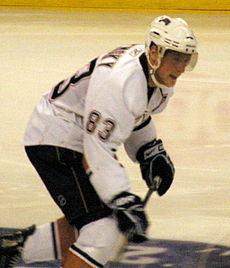
The team had reasonable success with other imports after Rosa, such as Radim Vrbata (who was later traded to Shawinigan), Jiří Fischer and Jan Němeček, but their luck changed when they chose Aleš Hemský seventh overall in the 2000 CHL Import Draft. Hemský scored 100 points (36 goals, 64 assists) in 68 games as a rookie, helping him in being chosen 13th overall in the 2001 NHL Entry Draft by the Edmonton Oilers. The next season, 2001-02, the Pardubice native scored 97 points (27 goals, 70 assists) in only 53 games. Upon his graduation from the QMJHL, Hemský made the immediate jump to the NHL with the Oilers. During the lockout, he had a banner year, as well, winning the Extraliga championship with HC Moeller Pardubice and a gold medal at the World Championships for the Czech Republic. Hemský may have missed several games over the years with injuries but he is still a considerable piece to the puzzle on the Oilers’ offence.
Since 2003, the team has been known as the Gatineau Olympiques. They have not had many NHL alumni as of yet, but they have had one considerable success with one former import. David Krejčí played two seasons in Gatineau after being chosen 63rd overall in the 2004 NHL Entry Draft by the Boston Bruins. He scored 63 points (22 goals, 41 assists) in his first QMJHL season in 2003-04, and he scored 81 points (27 goals, 54 assists) in only 55 games in his second. He bode his time in Providence for a while until the Bruins were ready to promote him to Boston. In 2008-09, Krejčí led the NHL with a plus/minus of +37. Three years later, he won the Stanley Cup, becoming the first Olympiques alumnus who had played in Gatineau to win it. He was one of two former imports to win the Cup that season since Bruins team captain Zdeno Chára is a graduate of the Prince George Cougars. In 2012, upon trading Ottawa Senators draft pick Jean-Gabriel Pageau to Chicoutimi, the Olympiques made team history by naming Pageau’s successor as captain to be Tampa Bay Lightning draft pick Adam Jánošík, making the Slovak defenceman the squad’s first import to wear the C.
The Kitchener Rangers have had several imports come through their organization but it has been the graduating class of such players in the last eight years that has made them one of the best places for them to play. Kitchener is one of very few organizations in the entire Canadian Hockey League that can boast that many of their imports have been chosen in NHL Entry Drafts from their rosters and not from European teams. The Rangers set this motion in place in 2003 when they selected towering defenceman Boris Valábik 48th overall in the 2003 CHL Import Draft, making him the first player from Slovakia to play for their team. A stay-at-home, bruising blueliner, Valábik scored only 15 points (three goals, 12 assists) in 68 games as a rookie, but he also recorded 278 penalty minutes. The Atlanta Thrashers took notice and they chose him tenth overall in the 2004 NHL Entry Draft. In 2004, the Rangers chose another European defenceman in the CHL Import Draft, choosing Czech blueliner Jakub Kindl tenth overall. In 2005, after scoring 14 points (three goals, 11 assists) in 62 games, Kindl also became a first-round NHL draft pick, being selected 19th overall by the Detroit Red Wings. Valábik and Kindl played together once more in 2005-06, a season in which Valábik became the first import in Rangers history to wear a letter as he was named an alternate captain.
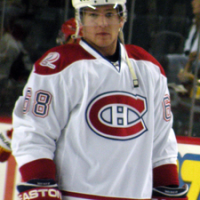
Upon the graduation of Valábik to the professional ranks, Kindl, now himself an alternate captain, was joined by yet another young blueliner ready to make his mark in the Canadian Hockey League. Yannick Weber was chosen 15th overall in the 2006 CHL Import Draft, making him the first Swiss player to suit up for the Rangers. Weber became a stellar offensive force for the Rangers immediately. He scored 41 points (13 goals, 28 assists) in 51 games as a rookie. The next year, 2006-07, Weber was named an alternate captain in Kitchener and, knowing that he was eligible for the 2007 NHL Entry Draft, he responded by scoring 55 points (20 goals, 35 assists) in only 59 games, as well as winning the OHL championship. He was chosen 73rd overall by the Montréal Canadiens at the 2007 NHL Entry Draft and the Habs wasted no time placing him in their system. The Rangers traded Weber to the Kingston Frontenacs in early 2007 but, since he never returned to the OHL, he is officially a Kitchener alumnus. Willing to keep a great trend alive, Kitchener looked for another NHL Entry Draft-eligible player to fill the import void on their team and they found exactly what they needed when they chose Danish forward Mikkel Boedker. After scoring 73 points (29 goals, 44 assists) in 62 games, Boedker was chosen eighth overall in the 2008 NHL Entry Draft by the Phoenix Coyotes, making him the highest-drafted Dane in NHL history. He immediately made the leap to the NHL the following season, continuing the trend of imports chosen out of Kitchener to make it to the NHL.
The year after Boedker’s graduation, the Kitchener Rangers had the sixth overall pick in the 2009 CHL Import Draft, which they used to select Slovak forward Tomáš Tatar, who had been selected 60th overall in that summer’s NHL Entry Draft by the Detroit Red Wings. They decided to trade Tatar to Plymouth for the player the Whalers had chosen third overall in that same import draft, Swedish forward Gabriel Landeskog. The Rangers immediately signed him to a two-year contract, knowing that he would be a top pick in the 2011 NHL Entry Draft due to his late 1992 birthdate. After scoring 46 points (24 goals, 22 assists) in 61 games as a rookie, he made history by becoming the first import captain in Rangers franchise history. Also, in 2010, the Rangers selected German forward Tobias Rieder with the fifth overall pick in that summer’s CHL Import Draft. In 2011, both Landeskog and Rieder were chosen in the NHL Entry Draft, being picked second overall by the Colorado Avalanche and 114th overall to the Edmonton Oilers, respectively, joining the list of imports to be drafted to the NHL out of Kitchener. Landeskog graduated immediately to the NHL and, to fill the import void on their roster, the Rangers chose Czech forward Radek Faksa with the 22nd overall pick in the 2011 CHL Import Draft. A highly-touted prospect for the 2012 NHL Entry Draft, Faksa will now join the list of imports to be drafted out of the Kitchener Rangers organization, bringing the total to seven thus far.
It is ironic to think that the team I feel the best in the Canadian Hockey League to develop imports is a team based in the United States. The only team based in the American state of Oregon, the Portland Winterhawks have had 27 imports play on their roster over the years and ten of them have gone on to play in the NHL thus far. The ratio of Czechs who have played on the team over the years to those who have gone to the big league is quite small, only being 9:1, it must be noted the only Czech, Jakub Klepiš, played only one season of major junior hockey in Portland, returning home after he was chosen 16th overall in the 2002 NHL Entry Draft by the Ottawa Senators. In addition, the only Dane to play for the Winterhawks so far in team history, Jannik Hansen, is enjoying considerable success in the NHL with the Vancouver Canucks.

When it comes to the Winterhawks, their best success has come with imports from two specific countries: Slovakia and Switzerland. Over the years, six Slovaks have played in Portland and all but one has gone to play in the NHL. The first was Richard Zedník, who played three seasons with the team between 1994 and 1997, scoring 167 points (79 goals, 88 assists) in 126 career games. He followed his WHL success with a nearly 12-year NHL career with Washington, Montréal, the New York Islanders and Florida. Andrej Podkonický came next, scoring 145 points (55 goals, 90 assists) in 135 career games. The next year, 1997-98, Portland drafted and signed a player who was then one of the greatest prospects out of Slovakia at the time; Marián Hossa joined the team and, after scoring 85 points (45 goals, 40 assists) that season, he won the Jim Piggott Trophy as the WHL’s top rookie, as well as the league championship and the Memorial Cup. When the older Hossa left to join the Ottawa Senators in 1998, the Winterhawks then drafted his younger brother Marcel, who later spent three seasons in Portland from 1998 to 2001, scoring 164 points (65 goals, 99 assists) in 188 career games. As well, between 1999 and 2002, another Slovak who later went on to play in the NHL joined the team; Jozef Balej scored 190 points (105 goals, 85 assists) in 176 games during that stretch. In 2010, Marián Hossa became the first former Portland Winterhawks import to win the Stanley Cup when he won it with the Chicago Blackhawks.
As for Switzerland, all three of the Winterhawks imports from that country have made dents in the NHL. The first of these was Luca Sbisa, who actually made his NHL debut with the Philadelphia Flyers while still with the Lethbridge Hurricanes. The Italian-born Swiss defenceman was acquired in a deal with Lethbridge in 2010 after being returned to the WHL from the Anaheim Ducks; going the other way was another import, Swedish forward Jacob Berglund, the younger brother of St. Louis Blues forward Patrik Berglund. Nino Niederreiter came soon after, scoring 130 points (77 goals, 53 assists) in 120 games. He was an alternate captain on the Winterhawks in 2010-11 after he was chosen fifth overall in the 2010 NHL Entry Draft, making him the highest-drafted Swiss player in NHL history. Also in 2010-11, Portland employed the services of Sven Bärtschi, who emerged leading all WHL rookies in scoring with 85 points (34 goals, 51 assists) in 66 games; despite that, new rules in the CHL did not let the 1992-born then-rookie win the Jim Piggott Trophy due to being older than other first-year players. (Mathew Dumba won the award instead.) This past season, Bärtschi scored an impressive 94 points (33 goals, 61 assists) in only 47 games, all while missing some time representing Switzerland at the 2012 World Juniors and a five-game emergency callup to the Calgary Flames in which he scored three goals.
*
PHOTO CREDITS: All team logos that were used in this article are courtesy of EliteProspects.







Niederreiter was already on the Winterhawks when they acquired Sbisa.
…
Gatineau didn’t move from hull, They play in the same building in the same place that they always have. The Robert Guertain Arena. The name of the city changed, thats all
Oh okay. Thanks. I will change that right now.